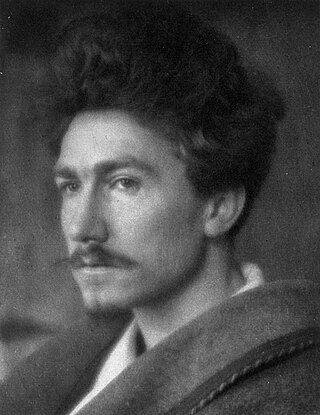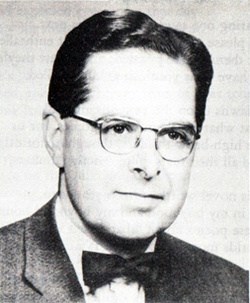Sources
- Willhardt, Mark; Parker, Alan Michael, eds. (2001). Who's Who in Twentieth Century World Poetry . Who's Who Series. London: Routledge. doi:10.4324/9780203991992. ISBN 0-415-16355-2.
| |
| By language |
|
|---|---|
| By nationality or culture |
|
| By type | |
This is a list of major poets of the Modernist poetry.

Imagism was a movement in early-20th-century poetry that favored precision of imagery and clear, sharp language. It is considered to be the first organized modernist literary movement in the English language. Imagism has been termed "a succession of creative moments" rather than a continuous or sustained period of development. The French academic René Taupin remarked that "it is more accurate to consider Imagism not as a doctrine, nor even as a poetic school, but as the association of a few poets who were for a certain time in agreement on a small number of important principles".
The Movement was a term coined in 1954 by J. D. Scott, literary editor of The Spectator, to describe a group of writers including Philip Larkin, Kingsley Amis, Donald Davie, D. J. Enright, John Wain, Elizabeth Jennings, Thom Gunn and Robert Conquest. The Movement was quintessentially English in character; poets from other parts of the United Kingdom were not involved.

This article focuses on poetry from the United Kingdom written in the English language. The article does not cover poetry from other countries where the English language is spoken, including the Republic of Ireland after December 1922.

Donald Alfred Davie, FBA was an English Movement poet, and literary critic. His poems in general are philosophical and abstract, but often evoke various landscapes.

Marianne Craig Moore was an American modernist poet, critic, translator, and editor. Her poetry is noted for its formal innovation, precise diction, irony, and wit. In 1968, she was nominated for the Nobel Prize in Literature by Nobel Committee member Erik Lindegren.
Georgian Poetry is a series of anthologies showcasing the work of a school of English poetry that established itself during the early years of the reign of King George V of the United Kingdom.

Modernist poetry in English started in the early years of the 20th century with the appearance of the Imagists. Like other modernists, Imagist poets wrote in reaction to the perceived excesses of Victorian poetry, and its emphasis on traditional formalism and ornate diction.

Basil Cheesman Bunting was a British modernist poet whose reputation was established with the publication of Briggflatts in 1966, generally regarded as one of the major achievements of the modernist tradition in English. He had a lifelong interest in music that led him to emphasise the sonic qualities of poetry, particularly the importance of reading poetry aloud: he was an accomplished reader of his own work.
William Hugh Kenner was a Canadian literary scholar, critic and professor. He published widely on Modernist literature with particular emphasis on James Joyce, Ezra Pound, and Samuel Beckett. His major study of the period, The Pound Era, argued for Pound as the central figure of Modernism, and is considered one of the most important works on the topic.

American poetry refers to the poetry of the United States. It arose first as efforts by American colonists to add their voices to English poetry in the 17th century, well before the constitutional unification of the Thirteen Colonies. Most of the early colonists' work was similar to contemporary English models of poetic form, diction, and theme. However, in the 19th century, an American idiom began to emerge. By the later part of that century, poets like Walt Whitman were winning an enthusiastic audience abroad and had joined the English-language avant-garde.
The British Poetry Revival is the general name now given to a loose movement in the United Kingdom that took place in the late 1960s and 1970s. The term was a neologism first used in 1964, postulating a New British Poetry to match the anthology The New American Poetry (1960) edited by Donald Allen.
Modernist poetry refers to poetry written between 1890 and 1950 in the tradition of modernist literature, but the dates of the term depend upon a number of factors, including the nation of origin, the particular school in question, and the biases of the critic setting the dates. The critic/poet C. H. Sisson observed in his essay Poetry and Sincerity that "Modernity has been going on for a long time. Not within living memory has there ever been a day when young writers were not coming up, in a threat of iconoclasm."
Swedish literature is the literature written in the Swedish language or by writers from Sweden.

Modernist literature originated in the late 19th and early 20th centuries, and is characterised by a self-conscious separation from traditional ways of writing in both poetry and prose fiction writing. Modernism experimented with literary form and expression, as exemplified by Ezra Pound's maxim to "Make it new." This literary movement was driven by a conscious desire to overturn traditional modes of representation and express the new sensibilities of the time. The immense human costs of the First World War saw the prevailing assumptions about society reassessed, and much modernist writing engages with the technological advances and societal changes of modernity moving into the 20th century. In Modernist Literature, Mary Ann Gillies notes that these literary themes share the "centrality of a conscious break with the past", one that "emerges as a complex response across continents and disciplines to a changing world".
American modernism, much like the modernism movement in general, is a trend of philosophical thought arising from the widespread changes in culture and society in the age of modernity. American modernism is an artistic and cultural movement in the United States beginning at the turn of the 20th century, with a core period between World War I and World War II. Like its European counterpart, American modernism stemmed from a rejection of Enlightenment thinking, seeking to better represent reality in a new, more industrialized world.
The SoundEye Festival of the Arts of the Word is an annual festival of poetry and other related art forms. It is held annually in Cork City over several days in either late-June to mid-July, with over 20 poets reading at the 2017 event. Events take place in venues such as the Guesthouse and Firkin Crane within the city.
Serbian poetry includes all poetry written in Serbian, starting from the Middle Ages until present day.